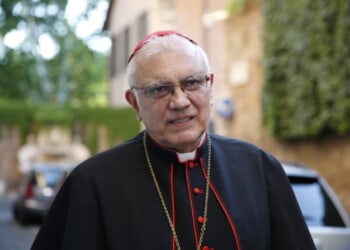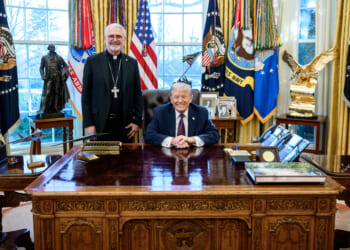Jesus tells a parable in Luke 18:9-14 about the Pharisee and the tax collector who went to pray in the temple. After their prayers, God responds only to the prayer of the tax collector, and He completely ignores the prayer of the Pharisee; “I tell you, the latter (tax collector) went home justified, not the former (Pharisee).”
What does it mean for the tax collector to be justified?
Justification means being reconciled with God and being at peace with Him, as St. Paul explains: “Now that we have been justified by faith, we are at peace with God through Our Lord Jesus Christ.” It means that we possess the grace of God now and a privileged calling to share in God’s glory, for “Through Christ we have gained access by faith to the grace in which we now stand.” Justification brings us into a powerful relationship with God through the Theological virtues, as we learn, “This hope will not leave us disappointed, because the love of God has been poured into our hearts through the Holy Spirit that has been given to us.” (See Rom. 2:1-5)
Imagine! Inner peace from God, a deeper relationship with Him, access to His powerful graces, strong faith, lively hope, and ardent charity—all these gifts from a few moments in prayer. This is the power of praying with a prayerful heart.
The tax collector received all these gifts of justification because he prayed with a truly prayerful heart. He did not come to pray just to fulfill a duty or to compare himself to others or to brag like the Pharisee. He came to commune with God with a heart that was disposed to receive the justifying action of God.
There are three things (three H’s) that make for a truly prayerful heart.
A truly prayerful heart is humble
The tax collector accepts his nothingness before God. He has no reason to brag about anything that he has or does. He humbles himself before God and even before his Pharisee companion. He does not look down on others whom he feels are worse than him. He realizes that anything good in him is a gift from God, and God maintains that good in him. All his focus is on God and not on himself or on the good or bad actions of others.
When we strive to pray with such a humble heart, we make space for God to act in our lives and to give us the graces of justification. Nothing blocks His action in our hearts more than our unrepentant pride; “God opposes the proud, but gives grace to the humble” (Jas. 4:6). Praying with a proud heart basically nullifies the power of our prayer.
A truly prayerful heart is honest
The tax collector is truly honest with God in his prayer. He is honest with God about who He is—the Holy One who makes others holy. He knows that God sees the truth in his heart, and that he cannot deceive God. He is honest about who he is before the all-holy God—a sinner in desperate need of divine mercy. He knows that the almighty God is also merciful, as he asks, “O God, be merciful to me, a sinner.” His deepest and truest need is divine mercy, and he is honest enough to reveal this need to God in prayer.
He is honest about what God’s truth demands of him. He is honest enough to admit that he has fallen short of the requirements of a true relationship with God. He does not pretend that his deeds are not sinful or try to reinterpret God’s commandments to suit his lifestyle and choices. He is honest with himself, of his sinful lifestyle, and of his need to repent. In the light of truth, he knows and accepts himself as a sinner. Unlike the Pharisee, the tax collector is in touch with the humbling truth that “all have sinned and have fallen short of the glory of God” (Rom. 3:23).
We also should be honest with God and ourselves. We must be honest in believing and living in the truth of God’s words as found in the Scriptures, Tradition, and Church teachings. We render our prayer useless when we pretend that we cannot know and possess objective truth or deny that truth is objective and unchanging. Our prayers are sterile when we buy into the illusion that truth cannot be known with certainty in anything and that we are to just figure it out as we go along. How can God act in our lives when we are not even honest with Him about our deepest needs?
Our prayers are also useless when we think that we can find saving truth merely through consensus, listening sessions, or dialogue with others. God cannot answer our prayers when we make up our own convenient truths and ignore the fullness of truth that He offers to us in Jesus Christ in His Church. “In many and various ways God spoke of old to our fathers by the prophets; but in these last days He has spoken to us by His Son” (Heb. 1:1-2).
A truly prayerful heart is hopeful
The tax collector places all his hope in God’s loving mercy and in nothing and nobody else. He does not have a good record of righteousness to brag about. He does not have a good reputation among his Jewish brethren that he can depend on. He does not have any religious achievements that he can use in boasting before God. He is completely dependent on God for His saving grace and sustenance.
We also should come to prayer with absolute trust and dependence on God in all aspects of our lives. Even as we make due efforts in the spiritual life, we must not place our confidence in our efforts, past successes, good intentions, or firm resolves. We cannot expect to receive divine action in our lives when we are so full of confidence in ourselves and not in God.
My dear brothers and sisters in Christ, it is not enough for us to pray regularly. We must also strive to pray with truly prayerful hearts. We must avoid the temptation of seeing prayer only as a duty, and see it instead as a means to transform our dispositions in this life and make us more humble, honest, and hopeful.
The holy sacrifice of the Mass is the most powerful prayer in this world because it is the very prayer of Jesus’ self-offering on the cross. It is also powerful because it is our privileged encounter with the God who justifies sinners who approach Him with truly prayerful hearts. But even this most powerful prayer requires a truly prayerful heart to fully receive its graces.
So let us offer our Masses, and all our prayers, with truly prayerful hearts, and God will surely respond to them with the graces of justification that we badly need.
Glory to Jesus!!! Honor to Mary!!!
Photo by Sammy Chandio on Unsplash











